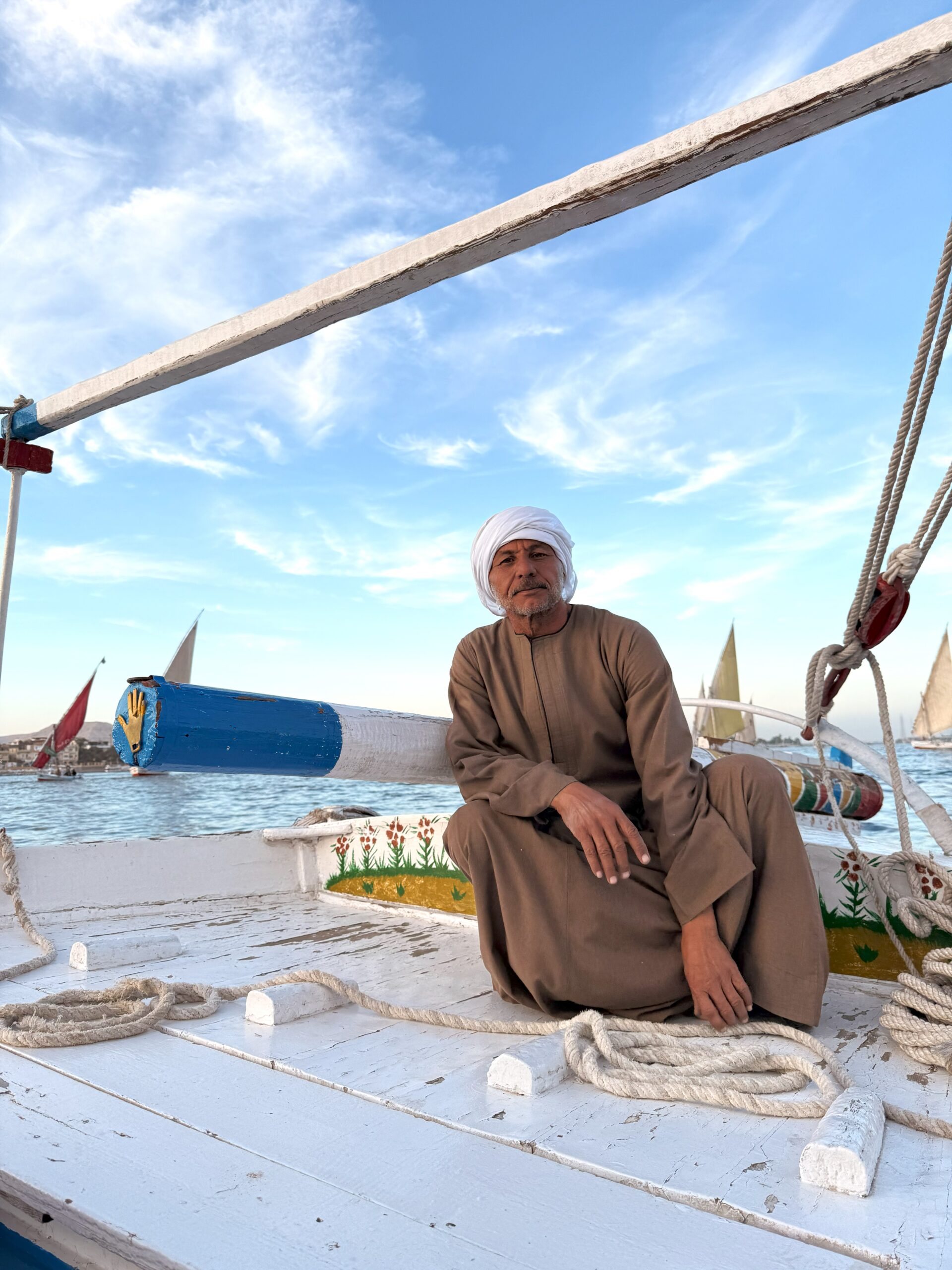

A Sunset Felucca Ride on The Nile, Luxor | Stories from Egypt
“Sunset felucca ride on the Nile? You know how much?”
“Egyptian boat ride. Indian price. Brother, come.”
“Very cheap price. One hour on the Nile. Only 10 Dollars!”
As we strolled down the Nile Corniche in Luxor, the familiar calls echoed around us. By now, nearly a week into our journey through Egypt, we were used to these voices. But that evening, all we wanted was a moment of quiet to soak in the colors of the sunset and watch life unfold along the Nile.
We hadn’t walked far when a Nubian boy with a wheatish complexion, curly hair, and a bright smile approached us.
“Come on, my felucca. Very cheap,” he said as he looked straight into my eyes. I, on the other hand, tried to look away, making an effort to ignore him.
I guess, in that fraction of a moment, he had grabbed Sourav’s attention because, the next minute, I realized that both of them were negotiating the price for the felucca ride.
“600 Egyptian Pounds for two hours, very cheap price for a beautiful sunset ride,” he said, while Sourav was nearly determined to pay him no more than 300 Egyptian Pounds!
When planning the trip to Egypt, many people had told us that bargaining was a must, and Sourav took their advice quite seriously! He ensured that every time a price was quoted to us, he would offer half of it and then negotiate. I usually stayed out of it, because bargaining isn’t my forte. But, as usual, Sourav stood his ground.
“300 not a good price, Sir. 400 Egyptian Pounds? Last price, best price,” the boy tried his best to convince us.
I’m sure he must have been very convincing because, before long, we followed him down the pier toward his felucca. His bright smile never wavered, while we were still unsure whether we had struck a good deal.
The sun was almost touching the horizon, casting golden hues over the shimmering waters of the Nile.
The boy stopped beside a felucca where an older man sat smoking a cigarette. The boy said something to him in Arabic. The man rose, nodded, and began untying the sail.
“He will be taking us? Please tell him about our deal…” Sourav couldn’t finish his sentence because the boy interrupted him, saying, “Don’t worry, he’s my father.”
Sourav said nothing more, stepping onto the boat. The old man extended a hand to help me in, and I followed. Soon, father and son pushed the felucca away from the crowded dock. Soon, he took control of the steering, and we settled into the boat, ready to enjoy the serene beauty of a Nile sunset.
As we drifted along, the Nile’s water seemed impossibly blue, justifying its Bengali name, neel nod – the Blue River. I couldn’t help but wonder how people back home, miles away, had chosen such an apt name. “Did someone come here to see the color of the water and then name it?” I was quite lost in my thoughts until the boatman spoke up.
“You’re from India? You look like an Egyptian…,” he said while looking at Sourav, and then he looked at me, “…and you, like a Nubian.”
I smiled back at him. By now, I was used to people in Egypt identifying me as a Nubian, likely because of my darker complexion. Nubians, an ethnic group from southern Egypt and northern Sudan, have darker skin and African features compared to Egyptians, who have a fairer, more Arabic appearance.
“I’m Yusuf,” he introduced himself while lighting another cigarette, “and this is Sailaway.” Pointing toward the mast, he gestured at the name painted in bright blue.
“Are you from Luxor?” I asked him.
“Yes, I live on the other side, on the West Bank. You know the Valley of Kings? There is my home,” he coughed a bit while responding and then continued, “My ancestors were tomb diggers.”
This was just the beginning, and over the next hour, Yusuf opened the book of his life in front of us.
“You understand my English? Or no?” Yusuf said, coughing. “My English, better than others in Luxor. I lived in Germany for two years, worked in a factory. Good life in Germany, not so good here in Luxor,” he coughed again.
While I was gazing at the horizon, Sourav asked, “Why did you come back from Germany?”
“For my mother. She convince me to come back. She make me marry in Luxor, and then I’m tied. Now, I have five children. Very hard life in Luxor, but I do it for my mother,” Yusuf continued, and somehow, we got engrossed in listening to his life story.
“I loved a girl in Germany, she was from Bavaria. We traveled a lot. She take me to Italy and Greece. This was 30 years back. I was young. Happy. Now, I’m old man.” Yusuf lit another cigarette.
“Why do you smoke so much when you’re coughing like this?” I asked, irritated by the smell.
Yusuf smiled. “I go to doctor, he also ask me to stop smoking. But I can’t stop. I try to reduce. Sometimes, I go home and lock myself in a room to cry. Life in Luxor, very hard,” his voice choked. “I wake up at 3 AM, get ready, and pray to Allah, then I come to my boat at 5 AM. I start my day early, so my business starts early. But business not good on all days.”
By this time, I had completely forgotten about the sunset and had started imagining Yusuf sailing at 5 AM. I started imagining his mother, the girl he was in love with in Germany, his wife, and his kids.
“I pray five times to Allah every day,” he said, while Sourav interrupted him to ask, “You pray in this boat?”
Yusuf nodded in affirmation, and I knew what Sourav would say next.
“This is the time for Maghrib namaz, no? You won’t pray now?” Sourav asked inquisitively.
“Not today. I pray when I’m alone. Not with others in the boat,” Yusuf coughed and replied.
Sourav fiddled with his phone for a second and asked, “Will you mind if I pray now?”
Yusuf nodded again, and then, looking at me, he asked, “You are Hindu?”
“Yes, we are. But he prays during sunset,” I replied, while Yusuf lit another cigarette and started looking at his phone.
Silence filled the felucca.
I wanted to capture that moment, but more than that, I wished I could hold on to it – floating on this quiet boat, gently carried by the Nile. My mind was filled with many thoughts, coming and going like ripples on the water, each leaving behind a feeling I couldn’t quite describe.
Why had our paths crossed with Yusuf’s? Why did he choose to share his life’s burdens with us? Did he open up to everyone this way, or was there something different about our meeting?
“This is my elder daughter,” Yusuf said, breaking the silence. He passed his phone to me, interrupting my chain of thoughts. On the screen, there was a photo of a beautiful girl with a broad smile. Yusuf swiped the screen to show me photos of all five of his children.
“All my hard work for my mother and my children. When they grow up, I am free,” Yusuf said. “They will do better than me, Insha’Allah.”
With sunset, the lights along the Nile’s banks twinkled, and the temperature dropped. Yusuf steered the felucca back toward the pier.
“It is nice to meet both of you. Come back tomorrow for another ride,” Yusuf said in a hopeful tone. “Will you have some tea? I can make you tea in my boat,” he offered.
By now, we were used to his coughing and smoking!
“No, thank you so much,” I said, and Sourav also responded nearly at the same time, “It was nice to meet you too. Thank you for such a beautiful ride, but we are leaving Luxor tomorrow.”
“May Allah bring you back to Egypt someday. And if your friends and family coming to Luxor, tell them about me. I have WhatsApp,” Yusuf said, taking a small piece of paper out of his pocket and giving it to Sourav.
We had reached the pier, and Yusuf’s son was waiting for him there.
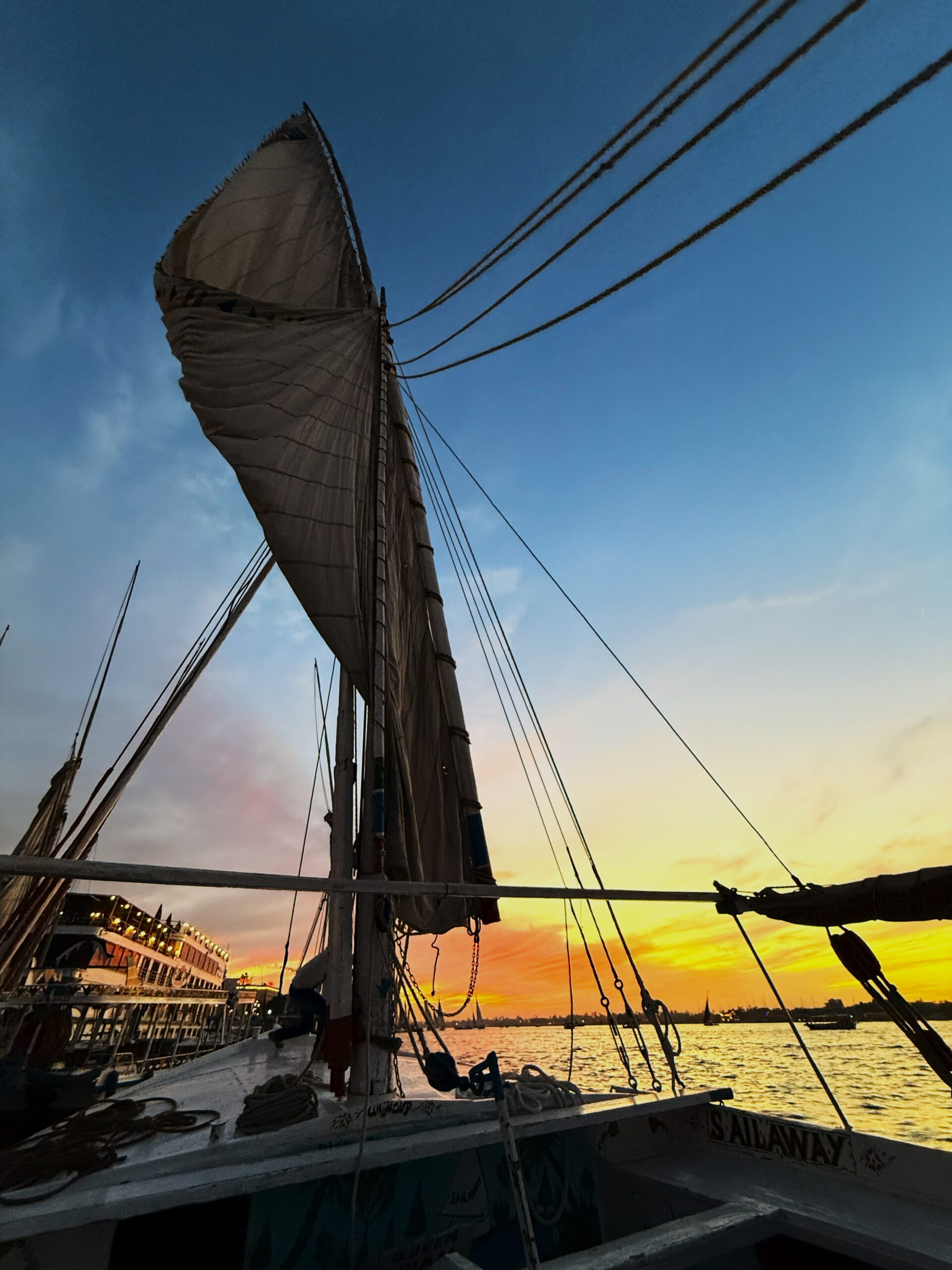
“Have some tea?” Yusuf said again, and then he gave me a small blue beetle, or what they call a ‘scarab beetle.’
“This is for you, for good luck,” he said.
I immediately identified the tiny artifact, because earlier that day, while we were at the Karnak Temple, I learned that in ancient Egyptian culture, scarabs represented the sun, eternal existence, rebirth, resurrection, good luck, and fortune.
Just as I was about to thank Yusuf, Sourav took his hand, folded the money in his palm, and handed it to him.
“How much you pay me?” Yusuf asked with a smile on his face.
“You can check,” Sourav replied, still holding Yusuf’s hand and touching them to his forehead in a gesture of prayer.
Yusuf laughed. “I believe in you. Come back again. And if you believe in God, make me die.”
There was another moment of silence, and I couldn’t register what he said. I just noticed that they exchanged a hug, while Yusuf’s son gave me a hand to get off the felucca.
We turned back for one last wave. Yusuf and his son were busy tying up the sail, their silhouettes blending into the darkening Nile.
“How much did you pay him?” I asked as we walked away.
“600 Egyptian Pounds,” Sourav replied with a smile. As we left the Corniche, I couldn’t help but carry Yusuf’s story with me, etched in my heart like the fading sunset over the beautiful blue river.
[Also Read: Exploring the Valley of the Kings in Luxor, Egypt | Travel Guide]
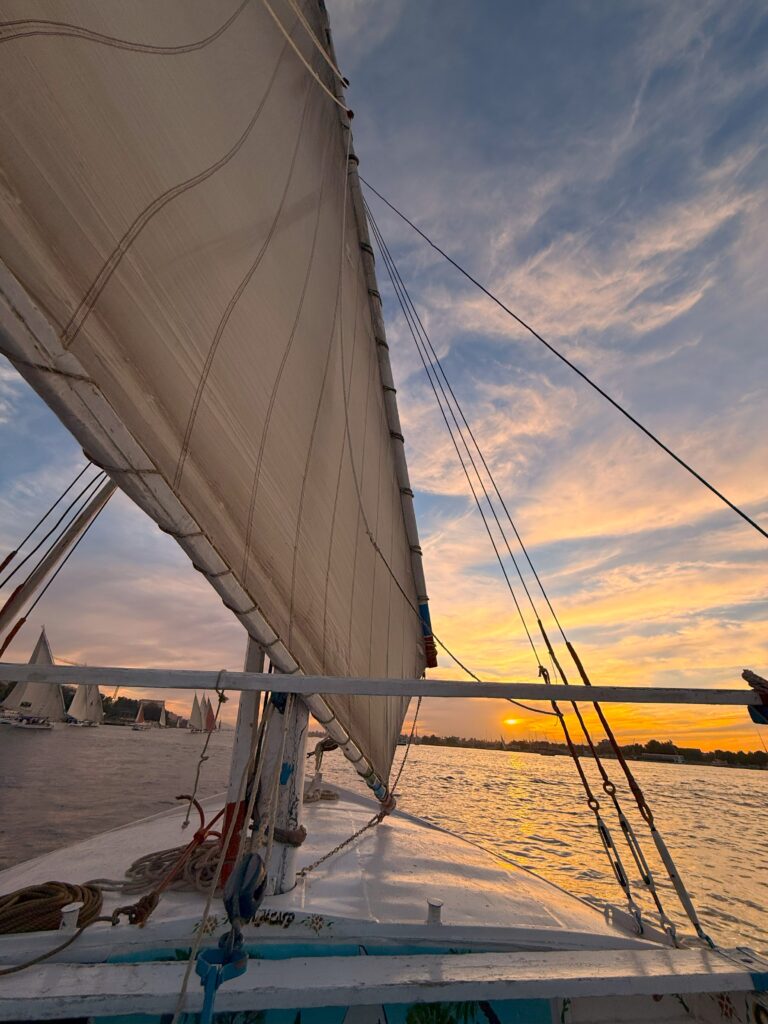
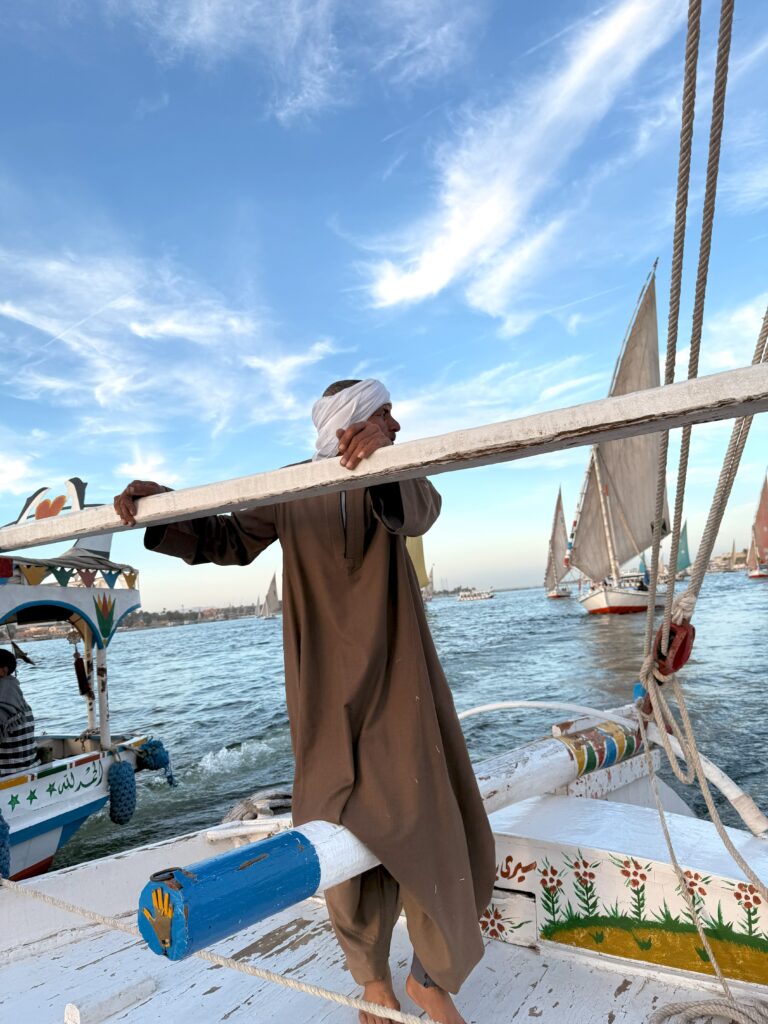
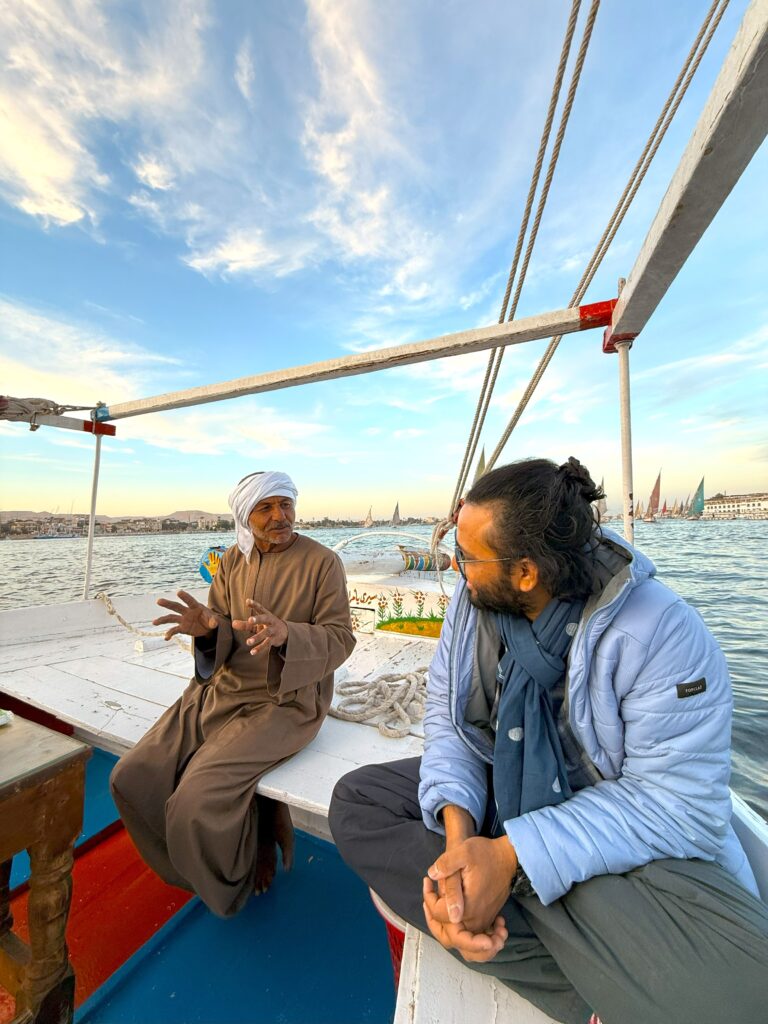
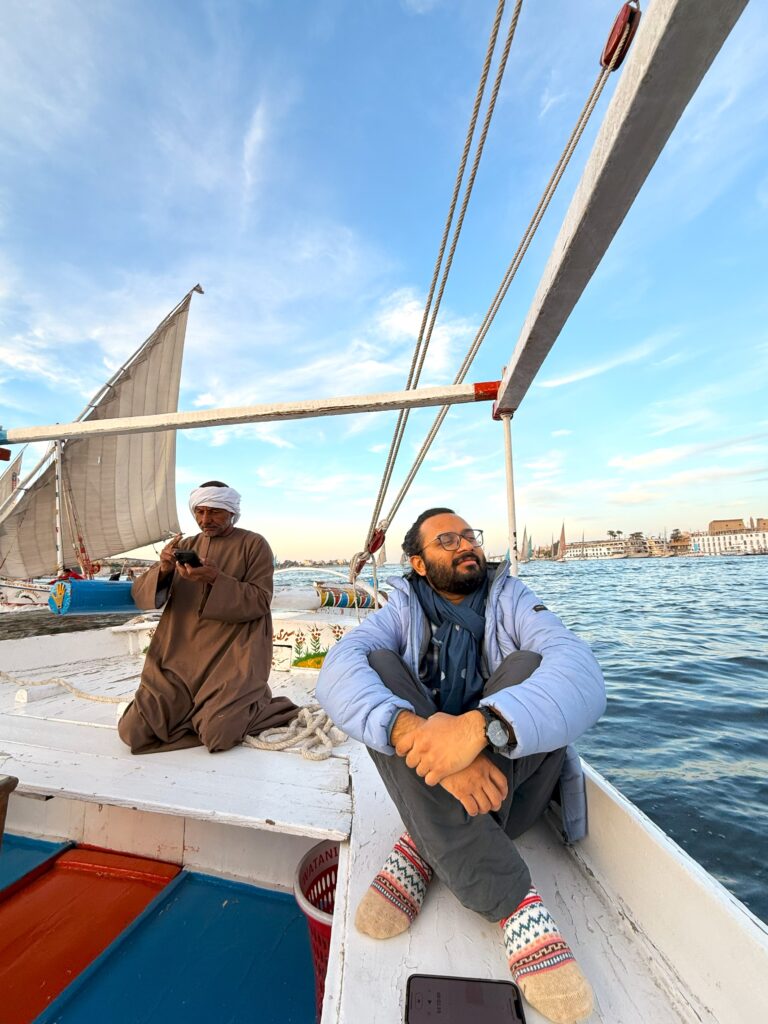

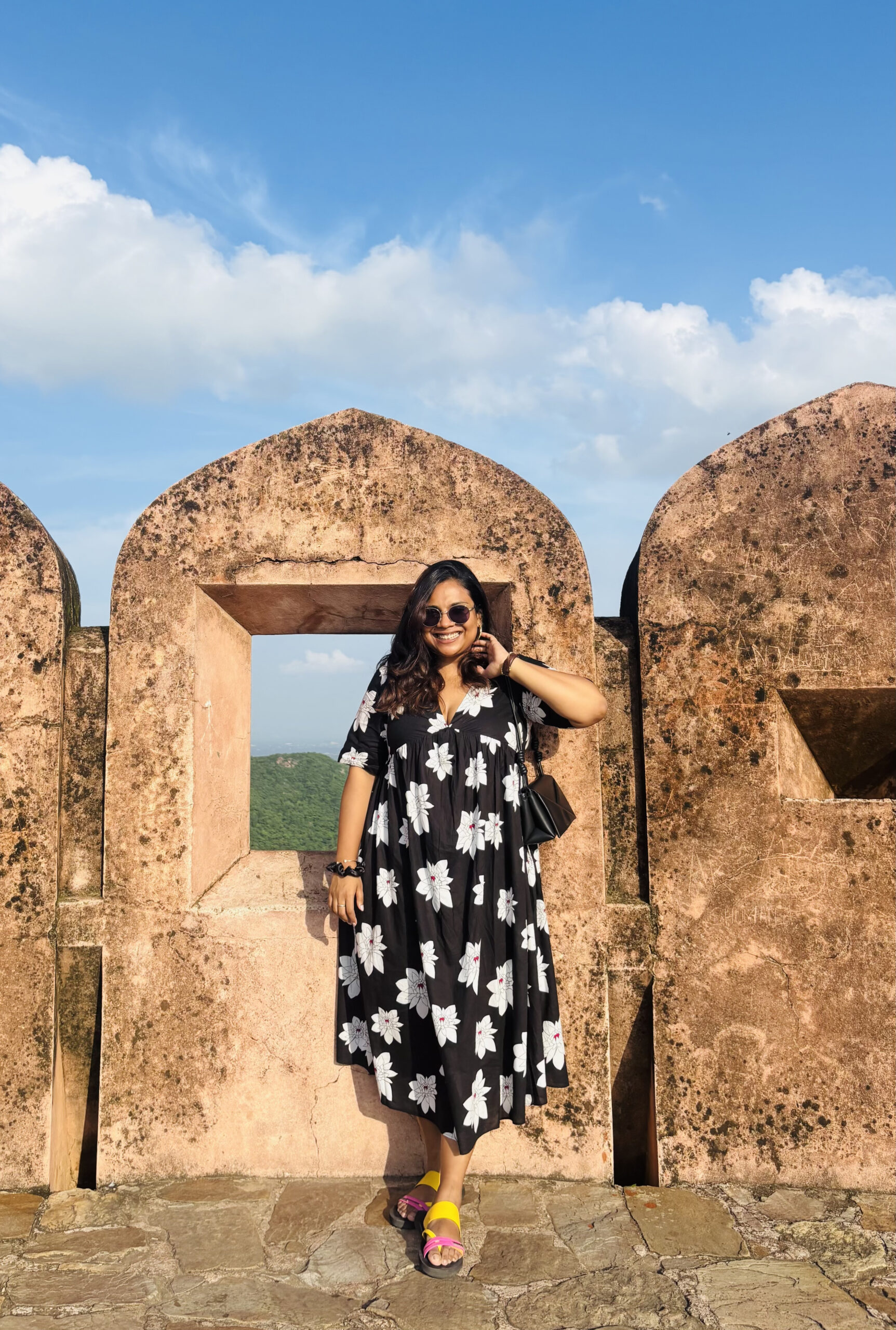

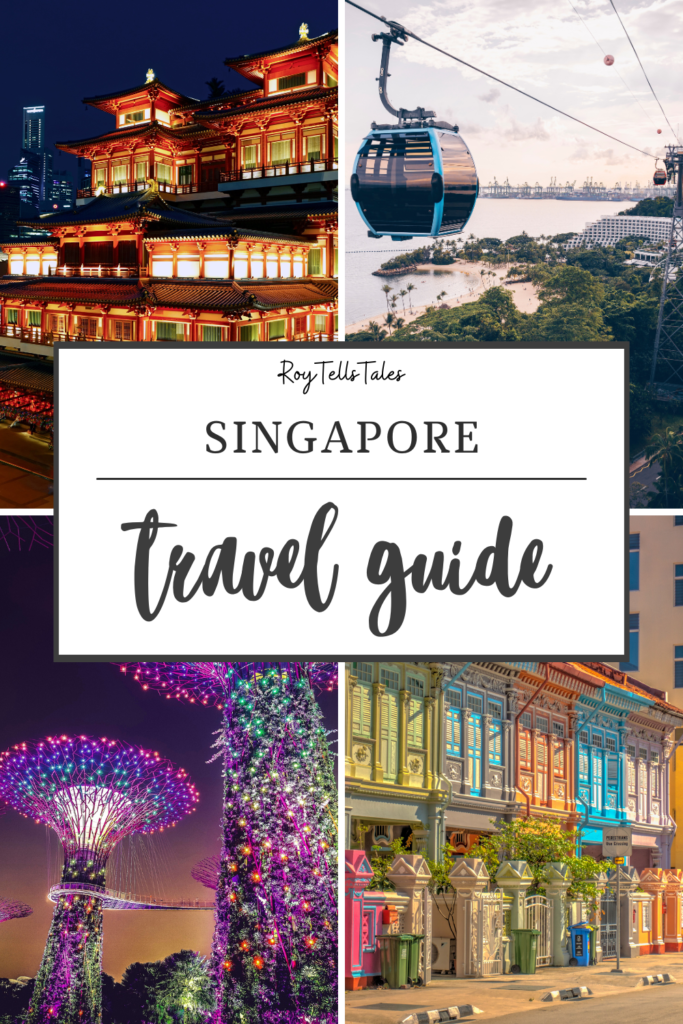
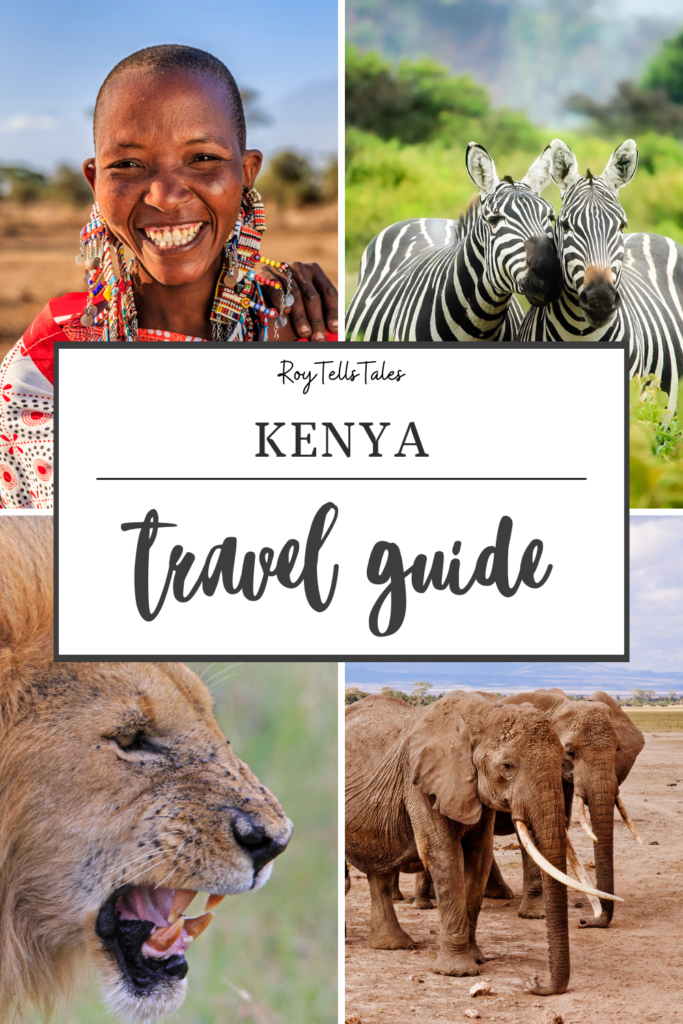
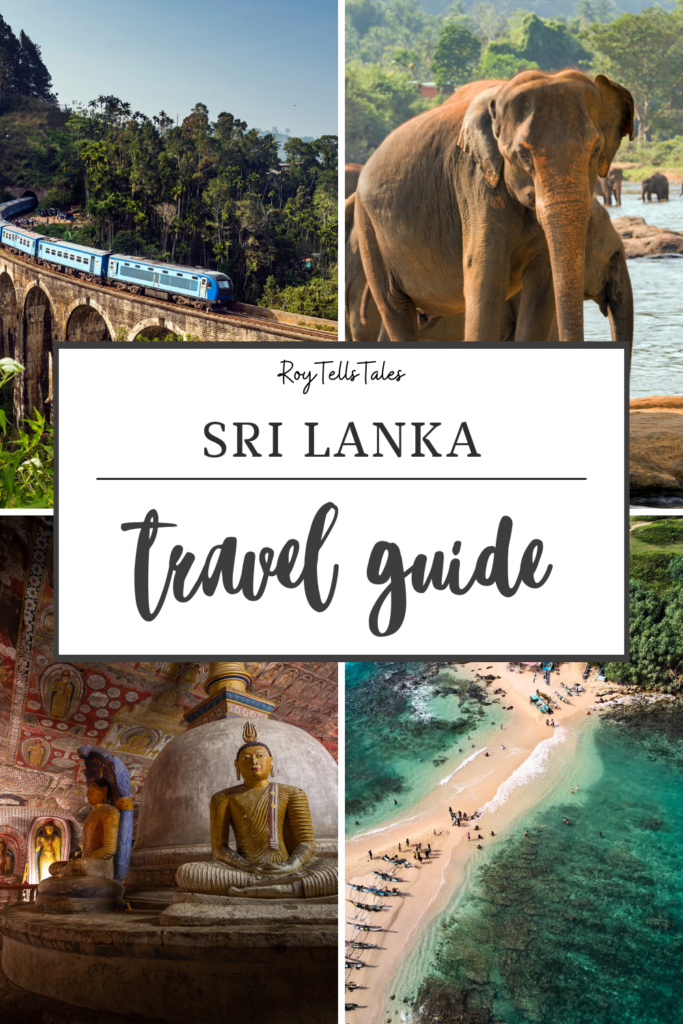
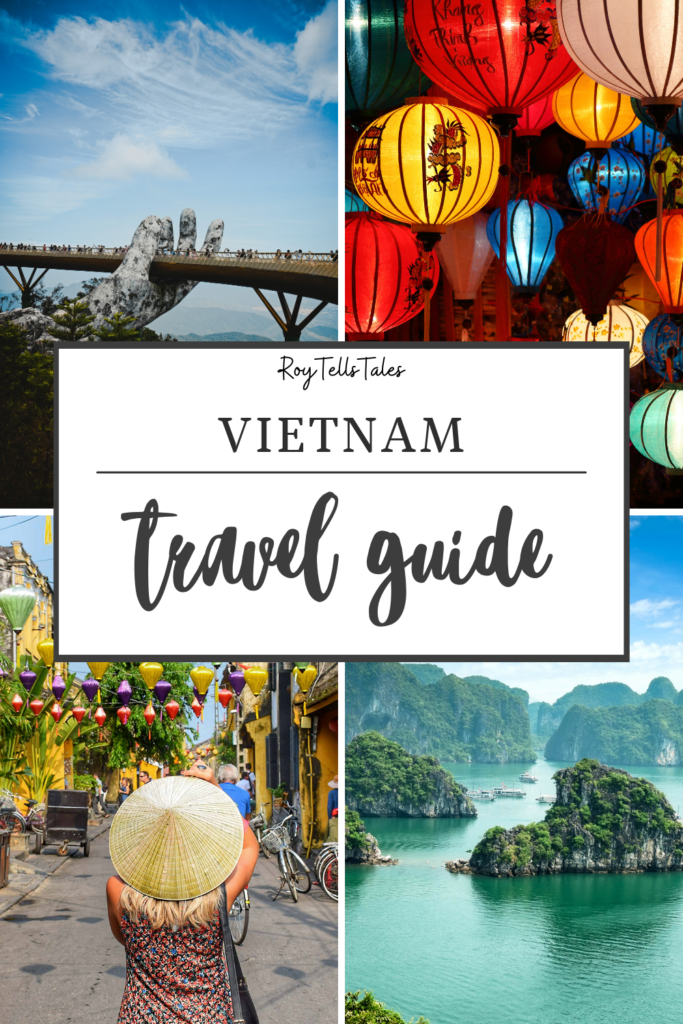
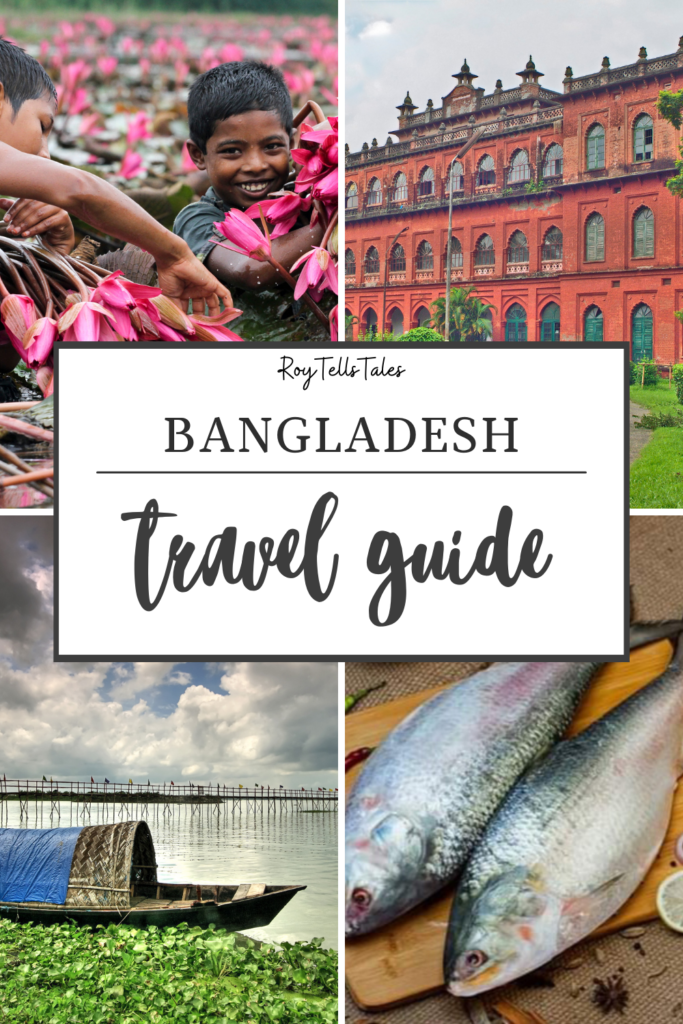
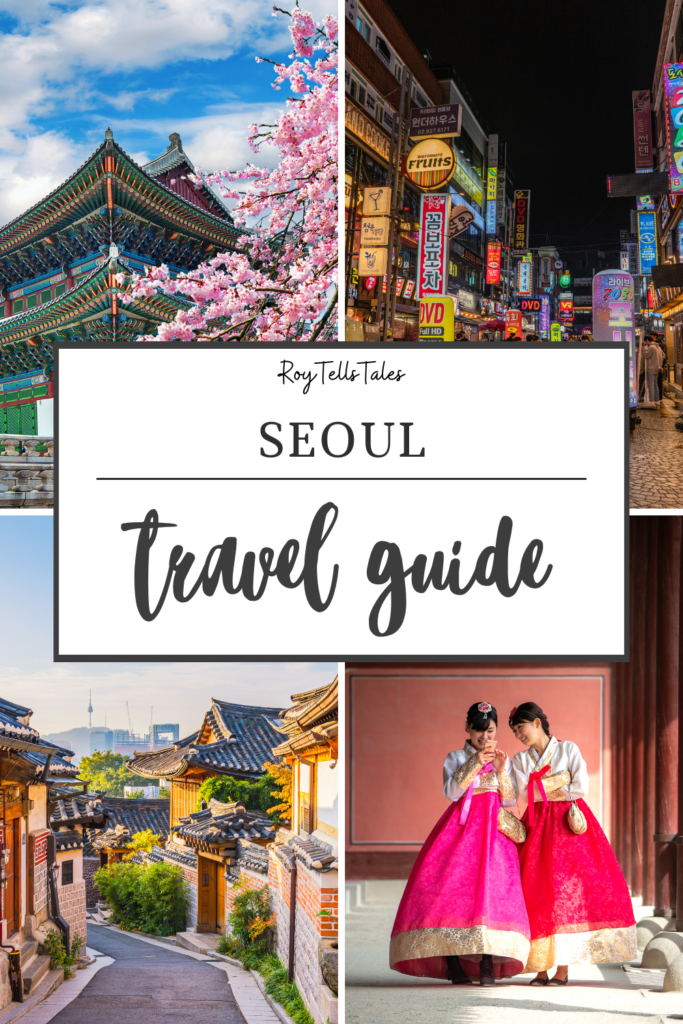








Riyanka, this is such a beautiful story. A tear ran down my cheek as I read Yusuf’s words. Beautifully written. May he find peace and happiness. 🤍
Thanks a lot, Divya.
Riyanka, such a touching story.
Thank you so much, Mona.
Hi Riyanka,
This is Yousuf, not from Luxor. I am a fan-brother of Sourav. You could say I discovered him after carrying December er Shohor with me for over three years. And today, through his story, I found my way here.
What a storyteller you are! So simple yet so detailed. No fancy words, just beautifully crafted to touch the soul of the reader. You captured every moment you experienced with such grace. I also write, and I must say, what you felt while floating over the Nile, I could feel through your words. That’s the true success of a storyteller.
Great job! I’ve followed you on Instagram and will eagerly wait to read more of your work.
Thank you so much, Yousuf. This message made my day. I’d love to read your stories too, I already took a glimpse of it.